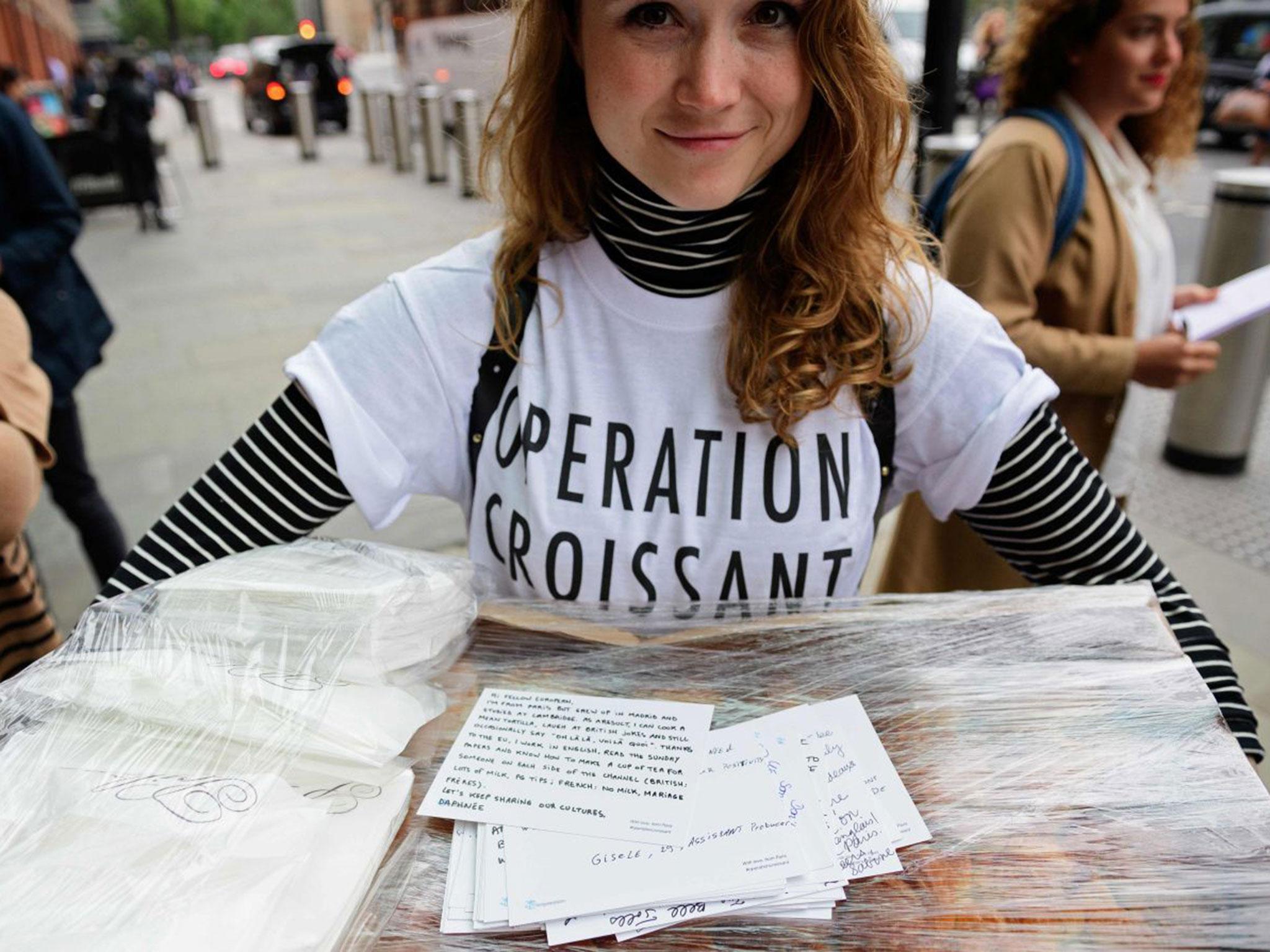EU referendum: The obscure law that stopped French Remainers handing out croissants to UK voters
'If you don’t stamp on the croissant, the next they’re handing out banquets'

Your support helps us to tell the story
From reproductive rights to climate change to Big Tech, The Independent is on the ground when the story is developing. Whether it's investigating the financials of Elon Musk's pro-Trump PAC or producing our latest documentary, 'The A Word', which shines a light on the American women fighting for reproductive rights, we know how important it is to parse out the facts from the messaging.
At such a critical moment in US history, we need reporters on the ground. Your donation allows us to keep sending journalists to speak to both sides of the story.
The Independent is trusted by Americans across the entire political spectrum. And unlike many other quality news outlets, we choose not to lock Americans out of our reporting and analysis with paywalls. We believe quality journalism should be available to everyone, paid for by those who can afford it.
Your support makes all the difference.Pro-Remain campaigners have been forced to abandon plans to give out campaign croissants due to a law dating from the 19th century .
Operation Croissant, a campaign organised by French and English nationals in favour of Britain remaining in the EU, was intended to be an act of “breaking bread”.
But the plans had to be altered after campaigners were contacted in advance by the Homicide and Major Crimes Command unit of the Metropolitan Police – who cover electoral fraud.
Giving out food as part of electoral campaigning - known as treating - is banned as a “corrupt practice” under section 114 of the Representation of the People Act 1983:
A person shall be guilty of treating if he corruptly, by himself or by any other person, either before, during or after an election, directly or indirectly gives or provides, or pays wholly or in part the expense of giving or providing, any meat, drink, entertainment or provision to or for any person…for the purpose of corruptly influencing that person or any other person to vote or refrain from voting.
This law is very similar to 19th century electoral legislation which preceded it.
Fresh croissants were intended to be given out at to commuters at Kings Cross along with postcards from Europe baring messages of solidarity to the UK. The group said they were unaware giving out food to voters broke the law. “This is totally at odds with the gesture we wanted to show,” said a statement issued by the group.
The pastries were instead given to a homeless shelter.
Organiser Rosa Rankin-Gee told The Independent: “The response [to the postcards] was very heart-warming - taken exactly as it was intended - a gesture of breaking bread.”
However, police were “absolutely right” to stop the croissants being given out, according to Professor Bob Watt, a specialist on electoral law at the University of Buckingham.
Before the Ballot Act of 1872 which introduced the secret ballot, it was “well known that people would hand out all sort of goodies in order to get people to vote,” Prof Watt told The Independent.
He continued: “Treating was common practice and was easier to do than giving money away when lots of people were involved. If you gave them a really good meal and a few drinks, they were more likely to vote for you.”
Treating used to be commonplace and references to it can even be found in Charles Dickens’ Pickwick Papers when candidates in the Eatanswill Election used green umbrellas to buy off female voters.
Despite the comic overtones of police preventing pro-European millennials from giving out pastries, treating is considered a “very serious offence” by Prof Watt. Preceding section 114, under which treating lies, is electoral bribery (section 113). Section 115 deals with undue influence on voters, which can include violence.
Prof Watt said: “It sounds using a sledgehammer to crack a nut, but years ago there were serious problems with it. If you don’t stamp on the croissant, the next they're handing out banquets.”
An allegation of treating also featured in the case of Lufter Rahman, the disgraced former mayor of Tower Hamlets, who was found guilty of electoral fraud. It was suspected supporters of Mr Rahman gave out meals to voters, Prof Watt said, but it couldn’t be proven to a criminal trial standard that the food had influenced voter’s decisions.
In 2015, Kim Rose, Ukip parliamentary candidate for Southampton Itchen, faced a police investigation for treating after he handed out sausage rolls at a party event. He was later cleared of any wrongdoing.

The EU referendum debate has so far been characterised by bias, distortion and exaggeration. So until 23 June we we’re running a series of question and answer features that explain the most important issues in a detailed, dispassionate way to help inform your decision.
What is Brexit and why are we having an EU referendum?
Does the UK need to take more control of its sovereignty?
Could the UK media swing the EU referendum one way or another?
Will the UK benefit from being released from EU laws?
Will we gain or lose rights by leaving the European Union?
Will Brexit mean that Europeans have to leave the UK?
Will leaving the EU lead to the break-up of the UK?
What will happen to immigration if there's Brexit?
Will Brexit make the UK more or less safe?
Will the UK benefit from being released from EU laws?
Will leaving the EU save taxpayers money and mean more money for the NHS?
What will Brexit mean for British tourists booking holidays in the EU?
Will Brexit help or damage the environment?
Join our commenting forum
Join thought-provoking conversations, follow other Independent readers and see their replies
Comments